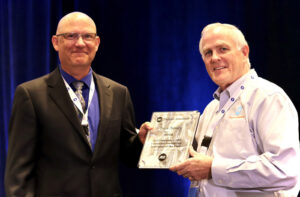
Steven E. Schillinger is a P.E. and PBE consultant in addition to being “actively retired.” He can be reached at schillingersteven@gmail.com and linkedin.com/in/seschillinger.
Many shop owners expect people will come flocking to their business because of how Covid-Safe it is. They may be in for a rude awakening.
Regulatory agencies are suggesting two broad types of instruments available to help shop owners through the Covid-19 shutdown. They can use traditional regulatory approaches (command-and-control methods) that set specific standards or they can use economic motivations and market-based programs that rely on achievements.

Two basic approaches exist. The first, a regulatory standard that mandates specific control technologies or processes that shop owners must use to meet permit requirements. The second, a voluntary standard that allows shop owners to choose from performance-based methods to meet that standard. At times, government may completely ban or phase out the use of a particular product, as it has done with chlorofluorocarbons, chromium, and other hazardous air pollutants. Regulations can be uniform or can vary according to the polluting entity, processes, or similar factors.
Voluntary, market-based approaches provide continuous incentives, both monetary and near-monetary, to encourage public safety. As a result, such market-based approaches create an incentive for shop owners and their employees to incorporate pollution prevention and innovation into their environmental protection decisions.
“Traditional regulatory compliance and voluntary pollution prevention approaches are valuable tools,” stated Tony Pendola, P.E. Small Business Ombudsman/SBEAP. “They provide consistency and can even result in an economic benefit.”
EPA has pursued a number of non-regulatory approaches that rely on voluntary initiatives to achieve improvements in emissions controls and management of environmental hazards. Those programs are usually not intended as substitutes for formal regulation but instead act as important complements to existing regulation.
Many of the EPA’s voluntary programs encourage polluting entities to go beyond what is mandated by existing regulation. Others have been developed to improve environmental quality in areas that policymakers expect may be regulated in the future but are currently not regulated.
The pros and cons of regulations under the Clean Air Act that specify work practices to be followed during the pandemic:
THE PROS:
- Shops are following EPA and OSHA requirements for better quality and safety
- It could be easier to refinance and/or sell the business
- Covid-Safe renovation can be completed quickly
- Shop owners can promote regulatory recognition concerning EPA and OSHA Hazardous Air Pollution prevention already covered by most Garage Keeper policies.
- These days everyone wants to be seen as being Covid-Safe. If you have something that people need that is superior to non-Covid-Safe alternatives, you can do well in the economic recovery.
- Opportunity — If you have a product or service in the Covid-Safe tech sectors or are dealing with everyday challenges customers face and are competitive, you are in a good place.
- Marketability — Since the media is still pushing Covid-19, businesses can find unique ways to take a promotional advantage.
- Competitive — As long as your service is just as good as or better than perceived alternatives out there you are in good shape. Even if you cannot compete on price, there are solid strategies to position your business to be desirable
- Difference — If your Covid-Safe service really makes a difference for the community and society, you can certainly leverage this in your branding and marketing. People like knowing what they purchase is going to help more than just themselves.
- Stability — Businesses that build not only a profitable business but one that integrates the social and environmental components that surround it, usually do better than their competitors.
THE CONS:
- Insurance carriers may deny a claim if they tie Covid-19 issues to non-compliance with federal rules such as the Autobody National Emissions Standards for Hazardous Air Pollutants (NESHAP 6H).
- Automotive facility requirements for regulatory “compliance” and/or “exemption.” Ref: autobody 6H exemption assistance
- Covid-Safe is intense … Right Now — those Covid-Safe businesses that market, position, and brand themselves as “Covid-Safe” as their main message will struggle when the Covid-Safe wave subsides.
- Conformity — Since Covid-Safe business is here to stay, keeping ahead of the competition in pollution prevention technologies and strategies can be challenging at times. For example, it is so 1990s to say, “We’re GREEN because we use recycled paper and solvent recovery in our business….”
- Complexity — It is hard enough to focus on one bottom line: Profits. Try focusing on three! True Covid-Safe shops not only focus on being profitable, they also take responsibility of the impact on people and the planet (known as triple-bottom-line or the three p’s.)
- Adaptation — Many service and repair shop managers are either traditional business people or environmentalists, but rarely both. To thrive as a Covid-Safe shop, you must be great at both.
- Competition… For Now — many shop owners expect people will come flocking to their business because of how Covid-Safe it is. They may be in for a rude awakening. If they do not compete on the traditional business components of functionality, quality, compliance, and/or price they will not succeed.
- Insurance companies may only pay “competitive rates” as determined under a Covid-Safe Garage Keeper agreement. This may reduce or eliminate the margins for shop owners to make a profit.
- Shops not certified by the vehicle manufacturer are unable to perform service or repair work given insurers’ control over the scope and price of the repair or replacement work.
IN CONCLUSION
Environmental, health and safety disclosure during the Coronavirus pandemic can influence consumer behavior through publicizing information on items such as regulatory permits, employee testing procedures, safety standards, and air pollution controls. By making owners, employees, inspectors, and customers a part of the regulatory process, all parties have an incentive to practice behavior that is socially responsible.
Information disclosure programs are designed to influence behavior through the dissemination of information on items such as repair processes, labor standards, and pollution levels, to the federal, state, and local government agencies, or to the public. By making shop owners, employees, shareholders, and customers a part of the regulatory process, all parties have an incentive to practice behavior that is socially responsible.
ADDED CONVERSATION
The North Carolina Department of Environmental Quality houses the Small Business Ombudsman Assistance Program, which is designed to assist small businesses with air quality and other regulatory requirements, encouraging environmental compliance and stewardship.
To learn more, go to: Government Assistance







Comments are closed.